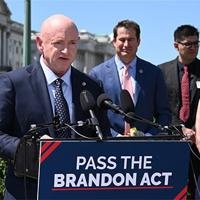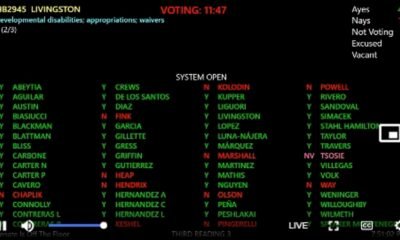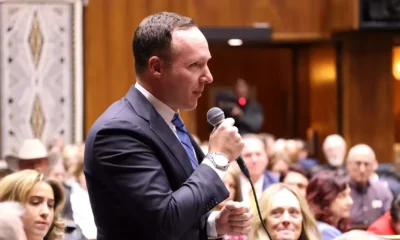arizona
AG Kris Mayes Unveils Bold Strategy to Shield Arizona from ‘Unacceptable’ Trump Policies

Arizona Attorney General Kris Mayes announced her intention to challenge potential abortion and immigration policy shifts proposed by President-elect Donald Trump’s administration.
During a press briefing on Tuesday, Mayes presented a detailed analysis of Project 2025, a comprehensive 900-page document she described as a right-wing roadmap developed by the Heritage Foundation, a conservative think tank. This project seeks to redefine the operational framework of the U.S. federal government, consolidating authority within the executive branch.
Drafted by former Trump aides in collaboration with over 100 conservative organizations, Project 2025 includes far-reaching plans such as a nationwide ban on abortion, increased executive control over the Department of Justice, enhanced immigration enforcement, and substantial cuts to federal agencies. While Trump has distanced himself from these proposals, key figures from his previous administration remain heavily involved, including former aide John McEntee.
Mayes criticized many suggested actions and legal reforms in Project 2025 as unconstitutional, particularly a revival of the Comstock Act of 1873. This archaic law would restrict the mailing of certain reproductive health medications, effectively establishing a national abortion ban. “Those provisions are unacceptable to the people of this country,” she asserted, defending the privacy rights enshrined in both the U.S. and Arizona constitutions.
The Attorney General emphasized her commitment to uphold these constitutional rights, referencing Arizona’s recent constitutional amendment, Proposition 139, which grants protections for abortion rights. However, she highlighted that a federal ban, if enacted, could override state protections. Although Trump claims to prefer state decision-making on abortion, there are suggestions from his allies for potential national restrictions.
Preparing for anticipated legal challenges, Mayes expressed her intention to defend Proposition 139 against adversaries. Additionally, she vowed to oppose incoming immigration policies, particularly the dismantling of the Deferred Action for Childhood Arrivals (DACA). For Mayes, this issue is a “line in the sand,” especially in light of Trump’s proposal for mass deportations, an approach she believes could destabilize the national economy.
Reflecting on her shift from Republican to Democrat, Mayes cited her experiences visiting migrant detention facilities during Trump’s first term. She condemned the idea of mass deportation as a pathway to human rights abuses, suggesting that it could ensnare innocent U.S. citizens in a bureaucratic dragnet.
Mayes confirmed that her office would continue pursuing legal action against individuals involved in the fake elector scheme from the 2020 election, despite the political landscape shifting with Trump’s return. “I have absolutely no intention of dropping the fake electors case,” she declared, reinforcing her office’s resolve to uphold justice as investigations progress.
Earlier this year, a grand jury indicted 18 individuals connected to the plot, which included several prominent Arizona Republicans. Notably, one participant has already reached a plea deal.
Despite recent Republican victories across various political contests, Mayes is optimistic about identifying collaborative opportunities with GOP counterparts. One area of focus is the allocation of opioid settlement funds, which she argues have been misdirected toward prison expenses rather than addressing the crisis. Although her legal challenge on this matter was denied by the courts, she intends to continue advocating for the fair use of these funds.
Mayes also expressed a desire for the Trump administration to enhance drug enforcement resources in Arizona and revive stalled legislation concerning border control. “We have been preparing for the challenges posed by Project 2025 for months,” she stated, confirming strategic discussions with Democratic counterparts from other states regarding potential pushbacks.
Looking ahead, Mayes acknowledged the disappointing voter turnout for Democrats in recent elections, emphasizing a need for introspection within the party. “We need to assess why that is,” she reflected.
In response to questions about potential electoral outcomes for Democratic leaders, she reiterated her focus on preparedness, stating, “Hoping for the best but planning for the worst.”


















